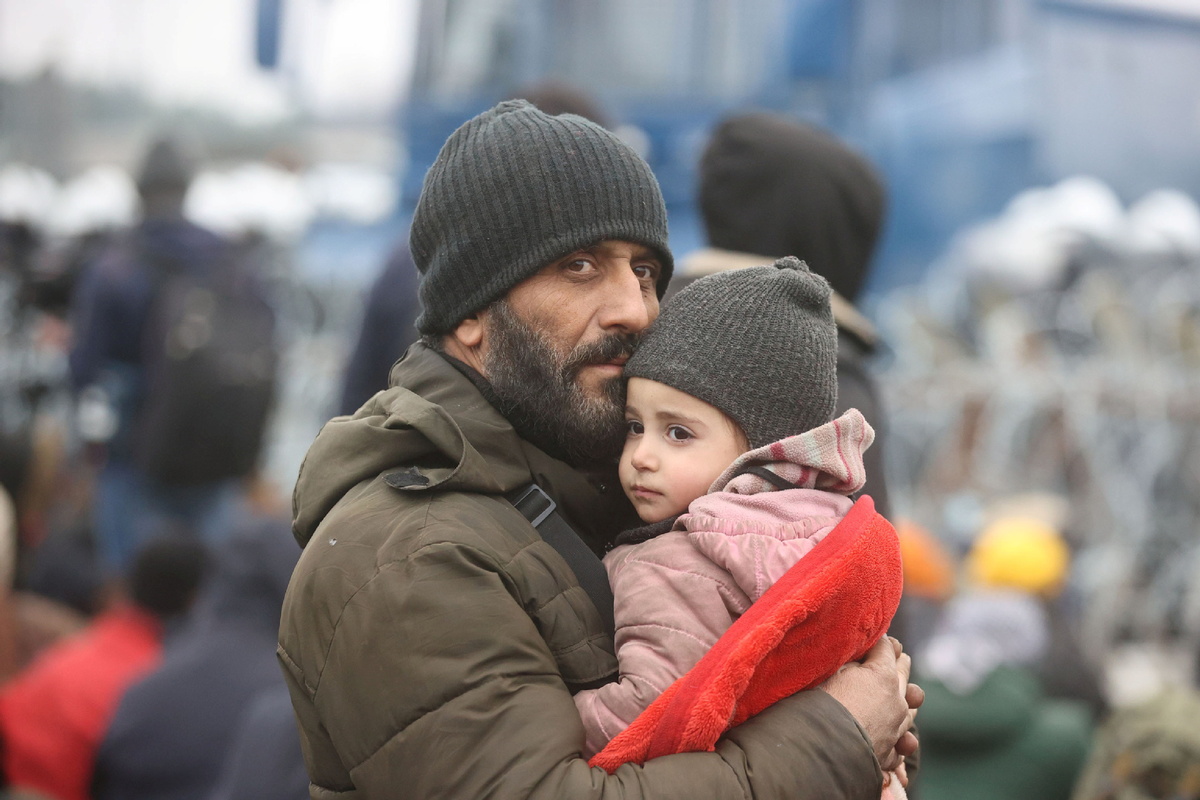EU crisis puts bloc's long-term failures in spotlight
By Harvey Morris | China Daily Global | Updated: 2021-11-19 09:20

The European Union is embroiled in its latest migrant crisis, accusing Belarus of dumping thousands of Middle Eastern refugees on the EU's eastern border.
Brussels ratcheted up the tension this week by applying fresh sanctions on the government of Belarusian President Alexander Lukashenko, alleging that it is behind the "illegal push of migrants".
The dispute has left thousands of refugees stranded in freezing weather on the sealed Belarus-Poland border, with reports of a number of deaths in what are described as catastrophic conditions.
Whatever the justification for the EU's claims that Lukashenko has deliberately engineered the crisis, in retaliation for the bloc's support for the Belarus opposition, the crisis has again exposed Europe's lack of a coherent policy toward would-be refugees and asylum-seekers.
Since the 2015 refugee crisis, when hundreds of thousands crossed the Mediterranean to flee war and persecution in the Middle East and beyond, EU states have sought to reinforce the borders of "Fortress Europe".
In that year, Germany's Chancellor Angela Merkel was the exception among EU leaders when she welcomed the refugees by declaring: "We can do this!"
In Germany and elsewhere, however, the 2015 influx fueled the rhetoric of right-wing populists who sought to persuade voters to blame their problems, economic and otherwise, on immigrants.
The crisis also provided the backdrop to the UK's 2016 Brexit referendum in which a proportion of voters were encouraged by anti-immigration propaganda from right-wing populists to believe that leaving the EU would somehow stem what was portrayed as a flood of refugees.
The current EU accusation against Lukashenko is that he has exploited this sensitive issue in Europe by encouraging would-be refugees to head to Belarus and use it as a backdoor into Europe.
Although most of the migrants traveling from Iraq, Syria, Afghanistan and elsewhere intended to make their way to Germany and other states of Western Europe, it is Poland that has occupied the front line of the present crisis.
Despite current political differences between Poland and its EU partners, the latter have stood by the government in Warsaw when it came to opposing Belarus in the present crisis.
With its latest sanctions, the EU has targeted airlines, travel agencies and individuals accused of facilitating the current migrant buildup at the Belarus-Poland border.
This represents the latest attempt to plug a hole in Europe's frontiers in the face of attempts by migrants to secure a safer and more prosperous future within its borders.
Russia's President Vladimir Putin, Belarus' ally, has blamed Western countries for the current crisis, saying it is the consequence of their past policies in Iraq and Afghanistan.
While Putin has promised to help resolve the crisis, countries in the Middle East have put hurdles in the way of would-be migrants.
A Syrian airline has halted its flights to Belarus, while the United Arab Emirates has now barred travelers from certain countries from flying there.
In addition, Iraq has said it will help repatriate any of its citizens currently stranded on the border who decide to return home.
Combined with diplomatic activity, such measures may help to resolve the present crisis, in which those trapped at the frontier are the main losers.
However, a short-term fix is unlikely to defuse a sometimes toxic debate about immigration into Europe.
In the EU, immigration from outside the bloc is often referred to as a threat rather than an opportunity. Contrary to Merkel's welcoming attitude in 2015, the EU as a whole has sought to reinforce its frontier fences and to pay countries such as Libya and Turkey to prevent would-be migrants from traveling on to Europe.
Rather than sharing the burden of accommodating the newcomers, prosperous northern EU states have placed the burden on countries such as Greece to cope with the challenges. It is a policy that has fostered illegal smuggling of refugees and multiple deaths among migrants thrown from leaky boats at sea.
The debate in Europe has highlighted the problems but almost entirely ignored the benefits of immigration.
With its aging population, Europe stands to benefit from an influx of overwhelmingly young, working-age newcomers. Rather than undermining the economies of host countries, the migrants can actually enhance them.
If and when the present crisis is resolved, it might be time for a more sober debate among Europeans about a more rational strategy that will respond to both the needs of the continent and those who wish to make it their home.
The author is a senior media consultant for China Daily UK.
























